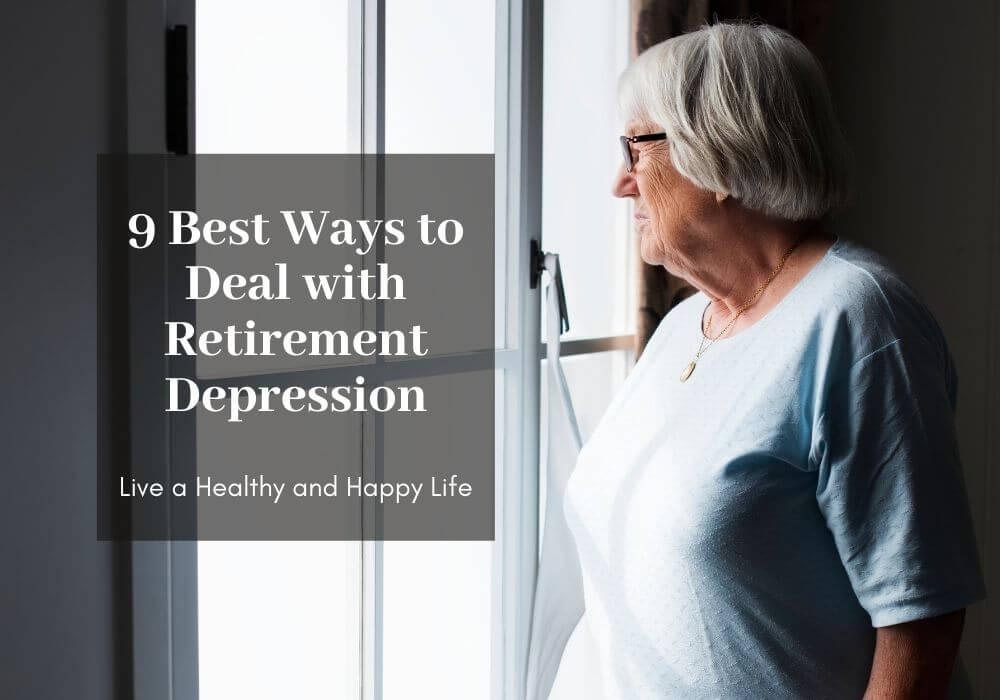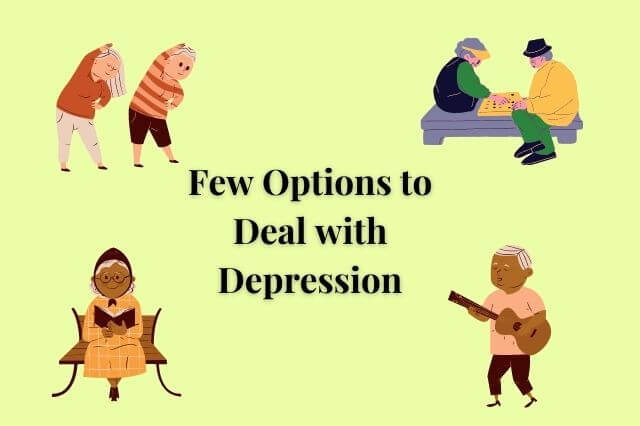
If retirement means you’re no longer working, does that mean retirement is a time of depression? Not necessarily. Retirement can be a time of fresh starts and new opportunities. Many people find retirement to be the most rewarding part of their life or they may experience some pain from leaving work behind. It’s important to know what retirement will do for your lifestyle before you make any decisions- so let’s take a look!
It’s a sad truth that retirement and sadness frequently go hand in hand. Depression can be induced by the loss of your sense of self-identity, retirement, or financial concerns. It’s not always simple to address feelings of melancholy and isolation after retiring. In this article, we’ll talk about how retirement causes depression as well as some helpful strategies for coping with it!
What Is Retirement Depression And Who Is At Risk For It?
There are many reasons why retirement might lead to depression. For some, the sense of freedom and lack of structure can be disorienting. Others may feel they have lost their place in society or that they’re no longer contributing anything meaningful. Financial difficulties are another common reason for retirement-related sadness.
Anyone can experience retirement depression, but some groups are more at risk than others. For example, people who have a difficult time adjusting to change or those without any planned activities may be more likely to suffer from such depression. Retirees who live alone are also at a higher risk, as are those who had a negative work experience.
Symptoms of Retirement Depression
The symptoms of the depression after retirement can vary from person to person, but often include feelings of sadness, loneliness, and emptiness. You may also experience a lack of motivation or interest in activities you used to enjoy. It’s not uncommon to feel irritable or angry more often than usual or to have difficulty sleeping or eating. If you’re feeling any of these symptoms, it’s important to talk to someone about them- preferably a professional!
Downheartedness after retirement can manifest in different ways. Some people experience physical symptoms such as headaches or chest pain, while others may find themselves engaging in risky behaviors or withdrawing from friends and family. It’s important to be aware of the signs and symptoms of retirement depression so you can seek help if needed!
Causes of Retirement Depression
Retirees face a variety of challenges when they leave the workforce, which has been linked to mental health issues. Some people who retire struggle with adjusting to their new circumstances and may feel lost or lonely without a job to keep them occupied. There’s also the fear that retirement will cause you to lose your identity- after all, most people spend years building up their careers!
Financial worries can also be a cause of retirement depression. As the costs of living rise, it’s difficult to make ends meet on just retirement income alone. This is especially true if you’ve lived an expensive lifestyle while working and don’t want to cut back significantly after retirement.
Think about your health! If you’re physically or mentally unable to work, retirement could be an opportunity for happiness. You might not think this at first but don’t give up hope – there are things that can help with depression in retirement and moving forward into the future. In this article, we’ll take a look at some great ways you can deal with retirement and move forward into your new life!
How to Deal with Retirement Depression
While retirement may appear to be a challenge, there are several strategies for coping with retirement sadness as well as making the most of your new existence. Please keep reading and find the 9 best ways to deal with retirement depression.

# Give Yourself Time to Adjust
It’s normal for retirement to come with a range of mixed emotions. It can take some time to get used to the new structure in your life, and retirement depression is often rooted in this sense of loss. It’s important to give yourself time to adjust- don’t feel like you have to jump right into a new activity or fill every waking moment with plans!
Consider taking things easy if you’re worried about retirement causing sadness. You may want to take on a part-time job for a year or two until retirement becomes more routine. It’s also important to understand that you don’t have to jump into retirement activities immediately! Take your time and set realistic expectations; there is no need to feel pressured by others’ opinions of how retirement should be spent.
However, many individuals who are in the workforce do not consider retirement an option. While this may seem like a good idea, it is important to note that retirement has its own set of challenges. It’s okay to take things slow and figure out what works for you in this new stage of life.
# Create a Retirement Plan
One great way to deal with retirement depression is to create a retirement plan! This can help give you structure and purpose as you enter into this new stage of life.
Your retirement plan doesn’t have to be elaborate- in fact, it can be as simple as a list of things you want to do in retirement. Maybe you want to travel, learn a new skill, or spend more time with family and friends. Having a plan will help keep you motivated and excited for retirement!
# Stay Social
Retirement depression is often caused by a sense of isolation and loneliness. It’s important to stay social in retirement and keep up your relationships with friends and family!
Many retirees find that their days are filled with more free time than they know what to do with. This can be a great opportunity to connect with loved ones and spend time doing activities you enjoy! If you find that retirement leads to depression, staying social may be the key to fighting it.
# Get Active
A great way to deal with retirement depression is to get active! This can help keep your mind and body healthy as you enter into this new stage of life.
There are many options for retirement activities. Some retirees enjoy traveling, others begin new hobbies like gardening or painting. If you are concerned about retirement leading to depression, consider getting active in a retirement activity that interests you!
# Take Care of Your Health
It’s natural to worry about retirement and the potential problems it might cause if you have poor health. retirement leads to depression for some, but if you take care of your health and maintain an active lifestyle it’s possible to enjoy retirement.
# Try New Things!
If retirement has made you feel bored or stagnant- fear not! Retirement is a great time to try out new activities that can help keep your mind and body young! Taking up a new sport or hobby may be just what you need to avoid retirement depression. You can read best musical instrument for seniors to learn and start your favorite one today!
# Tap Into Your Creativity
For some, retirement is a time of sadness, but it may help keep things interesting if you use your creative side! Consider an art class, opening up that sketchbook again, or even learning how to play the guitar- all of these activities can help keep your mind active and healthy.
# Stay Connected With The Workforce
Retirement leads to depression for some, but if you stay connected with the workforce, it can be a great way to avoid this problem!
There are many opportunities for retirees to stay connected with their former workplace. Whether it’s taking on a part-time job, volunteering, or even taking online courses; retirement shouldn’t keep you far away from staying connected to the workforce.
# Make A List of Uplifting Quotes
Retirement leads to depression for some people- but it doesn’t have to be that way! Consider creating a list of uplifting quotes and keeping them nearby as reminders that retirement can be a great time.
Quotes about retirement can help keep your outlook positive and remind you of all the good things to come in this new stage of life!
- “The best way to find out if you can trust somebody is to trust them.” -Ernest Hemingway
- “Age is an issue of mind over matter. If you don’t mind, it doesn’t matter.” – Mark Twain
- “Often when you think you’re at the end of something, you’re at the beginning of something else.” – Fred Rogers
When you’re getting ready to retire, one of the most important things you can do for yourself is creating a retirement plan. This will help give you structure and purpose as you enter into this new stage of life. Your retirement plan doesn’t have to be set in stone, but it should include some basic ideas of what you want to do in retirement.
Resources for those affected by retirement depression
Retirement is a time of change and uncertainty, which is why it’s important to have someone guiding you through the transition. For some people, this leads not only to feelings of depression but also to an increased risk for mental health conditions like anxiety.
If you’re feeling down in the dumps about your retirement future, don’t worry! There are many resources available if this is an issue for you:
- AARP offers a wealth of information about retirement, including articles on how to deal with retirement depression. AARP Retirement provides resources on retirement planning, including retirement calculators to help plan your financial situation in retirement. This website also includes its own suggestions on retirement and retirement planning, as well as signs that retirement is affecting you negatively.
In addition to that, you can visit following areas to develop your mental health:
- The National Council on Aging
- Programs of All-Inclusive Care for the Elderly (PACE®)
- Eldercare Locator
- Area Agencies on Aging (AAA)
- National Institute on Aging
- Health Finder
If you are looking for more general information on retirement and its effects, the U.S. News & World Report has a comprehensive article on the subject.
Depression is a common problem for many people throughout their life and retirement is no exception. This can be a difficult time for many of us because we haven’t planned enough or done research on how to handle this new phase while still being successful at work, maintaining relationships with family members (or friends), etcetera… But don’t give up!
Try taking a day off work once per week, going on an exciting road trip with your friends or family, or even finding a retirement hobby to help keep you busy. There are many things you can do to make retirement a great time– it just takes some effort!!
The Importance of Seeking Help If You Are Feeling Depressed About Your Retirement
If retirement has led to depression for you, it is important to seek help. This doesn’t mean that there’s anything wrong with you or that you’re doing something wrong; it just means that you need some extra support as you transition into retirement.
There are many ways to get help if retirement has led to depression for you. One of the best ways to find help is to talk to your doctor; they can provide you with a referral for a therapist or counselor who can help you through this difficult time.
If talking to your doctor doesn’t feel right for you, there are also many other resources available. The National Institute of Mental Health provides a list of mental health resources that are available to you.
Depression is a common problem for many people throughout their life and retirement is no exception. You have worked hard all of your life and deserve a relaxing retirement- make the most out of this time by seeking help if needed!
Depression is a serious condition that can affect people of any age, but it seems to be more prevalent in the older generation. The good news is that you don’t have to live your life alone or miserable after retirement. There are many ways you can cope with this debilitating state of mind so you don’t give up hope for your golden years.
In this blog article, we’ve gone through several of the most prevalent reasons why people get depressed after retirement as well as 9 practical methods to deal with your own or someone else’s sadness in order to live a happy life.
Please don’t forget to fill in the comment box below if any of the above suggestions assist you or your loved one in battling retirement depression. Your comments will encourage us to create more content!
YOU CAN ALSO READ :
*15 Post Retirement Activities You Can Choose To Avoid Depression
*What Are the Stages of Retirement & What to Do During That Time?
*Best 10 Dress Code Ideas: What to Wear to A Retirement Party?
*Best Retirement Party Decorations Ideas to Make It Memorable
*Best Emotional Support Dogs: 12 breeds for Seniors and Retirees




This page definitely has all of the info I needed about this subject and didn’t know who to ask.